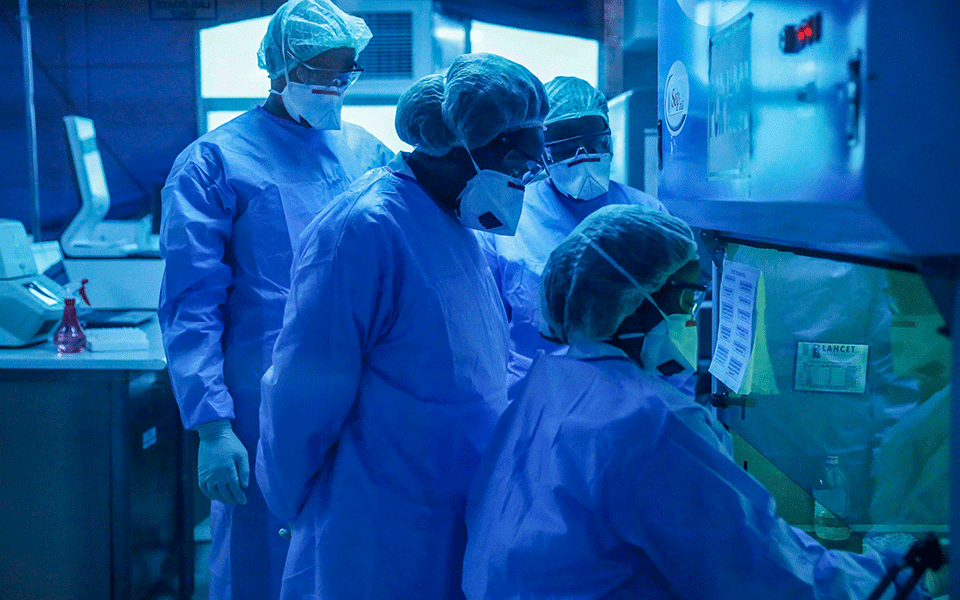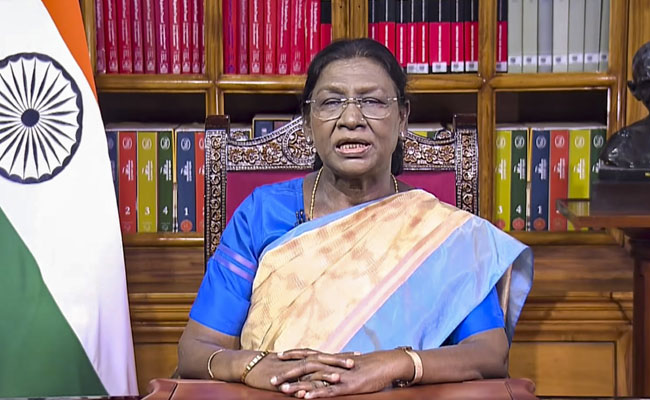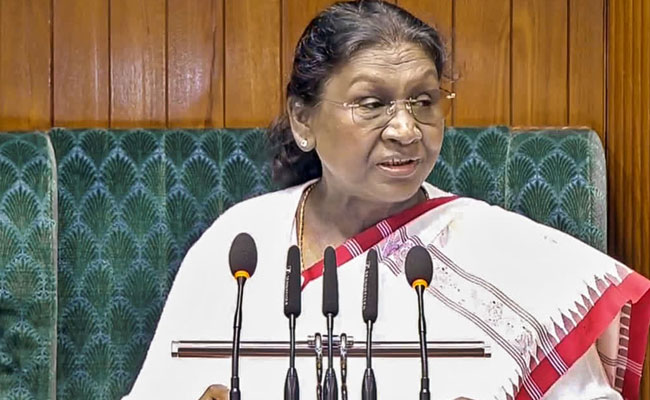New York: Scientists have found the first compelling evidence that two groups of ecologically important marine microorganisms could be eating viruses -- catching their "prey" and engulfing them, an advance that may lead to a better understanding of the flow of organic matter in the oceans.
The findings, published in the journal Frontiers in Microbiology, go against the currently predominant views of the role of both viruses and these groups of single-celled organisms called protists in the marine food webs.
"Our data show that many protist cells contain DNA of a wide variety of non-infectious viruses but not bacteria, strong evidence that they are feeding on viruses rather than on bacteria," said study corresponding author Ramunas Stepanauskas, Director of the Single Cell Genomics Center at Bigelow Laboratory for Ocean Sciences in the US.
The scientists explained that the predominant model of the role of viruses in the marine ecosystem is that of the "viral shunt," where microbes infected with viruses lose a substantial fraction of their chemicals back to the pool of dissolved organic matter.
However, the current study noted that the viral shunt could be complemented by a link in the marine microbial food web which may constitute a "sink of viral particles in the ocean."
According to the researchers, this finding "has implications for the flow of carbon through the microbial food web."
In the study, Stepanauskas and his colleagues sampled surface seawater from the Northwestern Atlantic in the Gulf of Maine in the US in July 2009, and the Mediterranean off Catalonia, Spain in January and July 2016.
They used modern single-cell genomics tools to sequence the total DNA from 1,698 individual protists in the water, and found evidence of protists with or without associated DNA.
The researchers explained that the associated DNA could be from symbiotic organisms, ingested prey, or viruses or bacteria sticking to the protists' exterior.
While the technique is very sensitive, the scientists said it doesn't directly show the type of relationship between a protist and its associates.
The scientists found a range of protists including groups called alveolates, stramenopiles, chlorophytes, cercozoans, picozoans, and choanozoans.
They said 19 per cent of the genome from the single cell organisms taken from the Gulf of Maine and 48 per cent of those from the Mediterranean were associated with bacterial DNA, suggesting that these protists had eaten bacteria.
But they added that viral sequences were more common, making up 51 per cent of the protists' genome from the Gulf of Maine and 35 per cent of those from the Mediterranean, with a frequency of one to 52 virus types per protist.
According to the researchers, most of these were from viruses known to infect bacteria -- presumably representing parasites of the protists' bacterial prey.
But they said choanozoans and picozoans, which only occurred in the Gulf of Maine sample, were different since these groups, neither of which have chloroplasts, are poorly known.
The scientists noted that the choanozoans are of great evolutionary interest as the closest living relatives of animals and fungi.
The tiny single-celled organisms were first discovered twenty years ago, and until now, their food sources were a puzzle, as their feeding apparatus is too small for bacteria, but ample for viruses, the researchers said.
In the current research, they found that every single one of the choanozoan and picozoan genomes were associated with viral sequences from bacteria-eating viruses called phages, but mostly without any bacterial DNA.
The same genome sequences were found across a great diversity of species, the study noted.
"It is very unlikely that these viruses are capable of infecting all the protists in which they were found," said Julia Brown, a co-author of the study at the Bigelow Laboratory for Ocean Sciences.
Based on these findings, the scientists concluded that choanozoans and picozoans "probably routinely eat viruses."
"Viruses are rich in phosphorus and nitrogen, and could potentially be a good supplement to a carbon-rich diet that might include cellular prey or carbon-rich marine colloids," Brown said.
The scientists believe the removal of viruses from the water may reduce the number of viruses available to infect other organisms, while also shuttling the organic carbon within virus particles higher up the food chain.
"Future research might consider whether protists that consume viruses accumulate DNA sequences from their viral prey within their own genomes, or consider how they might protect themselves from infection," Brown said.
Let the Truth be known. If you read VB and like VB, please be a VB Supporter and Help us deliver the Truth to one and all.
New Delhi (PTI): President Droupadi Murmu on Wednesday said the world saw the valour of Indian armed forces through Operation Sindoor when they destroyed terror camps on the strength of their own resources and asserted that any terror act will be responded with decisive action.
"India has proved that power can be used with responsibility and wisdom. The world has seen the valour and courage of Indian armed forces through Operation Sindoor," Murmu said in her address to both Houses of Parliament, marking the beginning of the Budget Session.
"Our nation, on the strength of our own resources, destroyed terror camps. My government sent a message that any act of terror will be responded to with resolute and decisive action," the President said, amid thumping of desks by Prime Minister Narendra Modi and other parliamentarians.
Murmu said the suspension of the Indus Water Treaty was part of India's fight against terror.
"We are also working on Mission Sudarshan Chakra to further strengthen national security," the President said, adding that security forces have also taken decisive action against Maoist terror.
Following Operation Sindoor, she said, the trust on Indian defence platforms has increased.
Murmu further said her government was committed to social justice in the country.
In the third term of the government, she said, work is being done to further empower the poor, and social security benefits are available to nearly 95 crore citizens now.
"My government is committed to true social justice," she said, adding that 25 crore Indians moved out of poverty in the last 10 years.
The President also said the government has been successful in tackling corruption and scams, and ensuring proper use of public funds.
"For India, the end of the first 25 years of this century has been filled with several successes, proud achievements and extraordinary experiences. In the last 10-11 years, India has strengthened its foundation in every sector," she said.
Lauding India's celebration of the 350th martyrdom day of the ninth Sikh guru, Guru Tegh Bahadur, and the country's tribute to revered tribal leader and freedom fighter Birsa Munda on his 150th birth anniversary, Murmu said, "when the country remembers the contribution of its ancestors, the new generation gets inspiration, which further speeds up our journey towards Viksit Bharat (Developed India)."
"The country celebrated the 350th Shaheedi Diwas of Sri Guru Tegh Bahadur Ji. During the 150th birth anniversary of Birsa Munda, the entire country paid him tribute and remembered his contribution to the tribal community," the President said.
"The events related to the 150th birth anniversary of Sardar Vallabhbhai Patel further strengthened the sense of Ek Bharat, Shresht Bharat (One India, Best India). The entire country became witness to how Bharat Ratna Bhupen Hazarika's birth anniversary celebrations filled the country with music and a sense of unity," Murmu said.
The President's mention of the Viksit Bharat – Guarantee for Rozgar and Ajeevika Mission (Gramin) (VB-G RAM G) scheme was met with loud protests from the Opposition benches.
Murmu said the VB-G RAM G initiative would provide guarantee for 125 days of work, would stop corruption and leakages, and provide a new impetus to rural development.
The Opposition members raised slogans demanding its rollback, even as the treasury benches thumped their desk in support of the scheme.
The President had to take a brief pause amid opposition cries of "vapas lo" (roll back) against the Act that replaced the Mahatma Gandhi National Rural Employment Guarantee Act (MGNREGA).
The Opposition parties have been demanding withdrawal of the VB-G RAM G Act and restoration of MGNREGA as a rights-based law in its original form, the right to work and the authority of panchayats.
The government has, meanwhile, claimed that the new Act will further strengthen the guarantee for rural employment.





